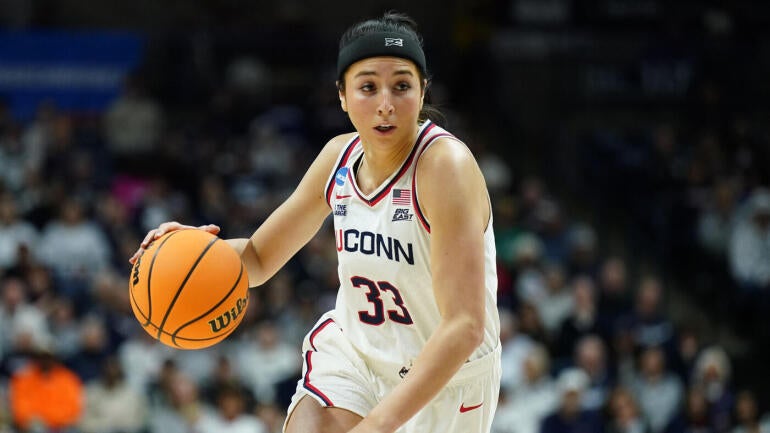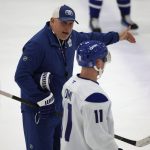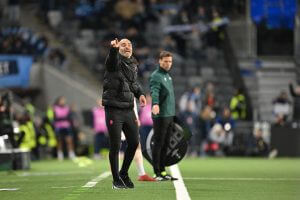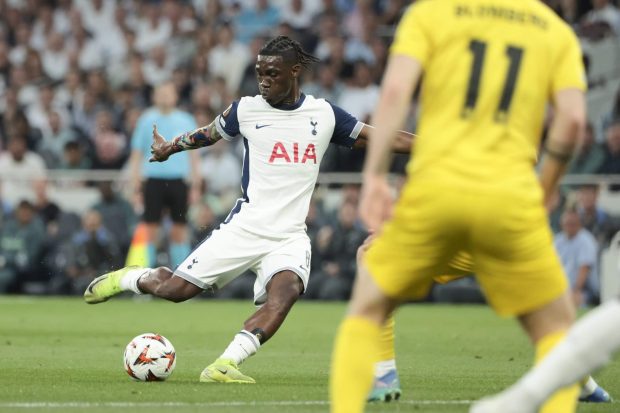

Until recently, Caroline Ducharme had to spend many of her UConn college basketball days inside her dimmed bedroom dealing with concussion symptoms. But even on the worst days, there was always a little bit of sunshine, sometimes in the form of Paige Bueckers and candy bouquets.
“One time after a concussion, Paige stayed back with me. I couldn’t travel and she was hurt, so she stayed back with me,” Ducharme told CBS Sports. “She came to my room with a bouquet of Laffy Taffys or something stupid like that, just a bunch of the long ones. Just stuff like that, being there for me, the little things.”
Those little things really mattered because Ducharme had many rough days. She has been in and out of the lineup throughout her college career because of head and neck issues. It all started in January 2022 during a game against DePaul.
“I got hit in the nose,” Ducharme said. “It shook me up at first, but I didn’t really know how serious it would be. It was a close game. The adrenaline of the game kind of kept me going. I didn’t realize how bad it was until about 24 hours later. I kept playing a little bit because it wasn’t that serious at that point yet.”
Ducharme even hit the game-winner with five seconds remaining, but the high of that victory didn’t last very long.
“Once I realized how bad it was is when I actually took some time off,” Ducharme said. “But I had no idea that it would turn into all of this.”
By “all of this,” Ducharme refers to staying in bed for days at a time with the lights off. It was more than just a headache because getting out of bed would make her nauseous and her fingers were constantly tingling. Even trying to watch her teammates on TV was sometimes too much.
Ducharme never imagined this would happen to her, and it was difficult to accept her condition was that serious. There were times when she thought she was ready to travel, but would find herself throwing up on the plane.
Ducharme had two or three more concussions, but it’s hard to keep count because the first one caused significant damage.
“(The doctors) realize now that I never fully recovered from the first one, which made it easier for me to get more, or easier for me to have worse symptoms with the smaller hits that I was getting,” Ducharme said. “I would get hit in the head and be out for weeks or months at a time.”
The severity of the situation led to uncertainty and some tough questions regarding her basketball career.
“We had a lot of really difficult conversations over the last several years about what’s her future,” said Ducharme’s mother, Chrissy Ducharme. “We didn’t know if she would ever feel good again, never mind play basketball.”
Support amid the struggle
It was a stressful time for the entire family, but all that mattered was being there for her.
“I kept saying, ‘She is not sky diving, she’s playing basketball,'” Chrissy said. “People were saying, ‘Oh, are you not going to let her play anymore?’ I was like, ‘That’s not the issue. The doctors have cleared her, she’s good, but she is still in pain.’ …This is her journey and this is something that she loves. Just knowing what she’s been through and that she still wants to keep going is amazing. We want to support that.”
Ducharme’s parents, currently in Boston, would attend UConn games even when they knew she was not going to play. Ducharme constantly told them they didn’t need to come, but they wanted to be there even if it was just to give her a hug and check on her.
“The fact that she wasn’t playing, that didn’t really have to do with whether we would come or not,” said Ducharme’s father, Todd Ducharme. “You talk to her on the phone, but you gotta look at her to see how she’s doing. You could tell in the eyes and could tell just in her body language how she was doing at that particular time.”
Ducharme said that after every concussion, the coaching staff would ask her if she wanted to continue playing. She said yes every time and promised to put in the work to get back on the court.
Ducharme got the full support from her coaches, while also never feeling pressure to rush the process.
“Coach (Geno Auriemma) would always remind me that he knows how hard I work and he knows how hard I am on myself,” Ducharme said. “And not to let that get in the way of my health, that he cares about me as a person as well and just to get myself back, to get my life back.”
Ducharme’s teammates were also her biggest cheerleaders. Their confidence kept her going, even when she had doubts herself.
“There were times I didn’t know if I would come back, and when I came back they were all like, ‘We knew this was going to happen, it was only a matter of time,'” Ducharme recounted. “They are always the ones reminding me to celebrate the little things. I’ll be frustrated because I can’t complete a workout and they are like, ‘You couldn’t even start this workout a couple months ago.’ So they’re always the ones there to remind me how far I’ve come. They’ve seen all of it and they’ve seen how bad it’s gotten, and now they are seeing it get better.”
Paving a way back
Getting her life back was easier said than done, but Ducharme took the first step in April 2024 after there was no more treatment she could do in Connecticut.
“We basically exhausted all the protocols that are pretty standard with concussions.” Todd said. “When Caroline shut it down her junior year and decided not to continue playing, or take a pause I should say, we scoured basically the earth to find who the best concussion folks were.”
They found Aviv Clinics in Florida and decided to move the family there for three months. That journey went from late April to July. Despite being far away, Ducharme’s teammates still showed up for her.
“Paige came out and spent three or four days with Caroline,” Chrissy said. “Caroline wasn’t doing very well, so it wasn’t going to be like this big, ‘Oh, we are going to go to the beach, and we are going to go here and there.’ Paige just came in and they just kind of laid on the couch, watched movies, got some food. It was really nice. A couple other friends had done that too. Just to be there for each other is amazing.”
Ducharme’s treatment included seating in a hyperbaric oxygen therapy chamber for two hours at a time and playing brain games on a tablet. She would also see multiple physical therapists and trainers for eye tracking, balance and reaction time exercises, as well as strength training once she was ready. Ducharme had to spend about five hours a day at the clinic, but it was well worth it.
Her parents said they quickly noticed their daughter improving and getting her confidence back.
“It was an incredible commitment because we had to move the family there for three months, but it is the one thing that has made the most impact in her recovery,” Todd said. “There is still more to go, but that is what sort of got her over the hump and got her back feeling like, ‘Yeah, I can do this.'”
Ducharme is still in touch with the doctors at Aviv and there is still a chance she could return for more treatment, although that is something she is still deciding.
Despite not feeling 100% yet, Ducharme has already been cleared to play basketball and is looking forward to doing more during her final season at UConn. She said being cleared is only the first step, but things are looking up.
“I feel like I’ve definitely gotten my life back outside of basketball,” Ducharme said. “And I think being able to put a jersey on or step on the court and be cleared was something that I didn’t know I would ever have again.
“…I’m definitely happy with where I am but I’m continuing to get better. This is not where I want my story to end.”
This news was originally published on this post .











Be the first to leave a comment